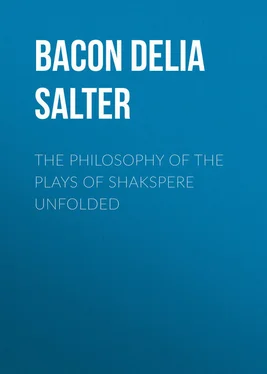Delia Bacon - The Philosophy of the Plays of Shakspere Unfolded
Здесь есть возможность читать онлайн «Delia Bacon - The Philosophy of the Plays of Shakspere Unfolded» — ознакомительный отрывок электронной книги совершенно бесплатно, а после прочтения отрывка купить полную версию. В некоторых случаях можно слушать аудио, скачать через торрент в формате fb2 и присутствует краткое содержание. Жанр: literature_19, foreign_antique, foreign_prose, на английском языке. Описание произведения, (предисловие) а так же отзывы посетителей доступны на портале библиотеки ЛибКат.
- Название:The Philosophy of the Plays of Shakspere Unfolded
- Автор:
- Жанр:
- Год:неизвестен
- ISBN:нет данных
- Рейтинг книги:3 / 5. Голосов: 1
-
Избранное:Добавить в избранное
- Отзывы:
-
Ваша оценка:
- 60
- 1
- 2
- 3
- 4
- 5
The Philosophy of the Plays of Shakspere Unfolded: краткое содержание, описание и аннотация
Предлагаем к чтению аннотацию, описание, краткое содержание или предисловие (зависит от того, что написал сам автор книги «The Philosophy of the Plays of Shakspere Unfolded»). Если вы не нашли необходимую информацию о книге — напишите в комментариях, мы постараемся отыскать её.
The Philosophy of the Plays of Shakspere Unfolded — читать онлайн ознакомительный отрывок
Ниже представлен текст книги, разбитый по страницам. Система сохранения места последней прочитанной страницы, позволяет с удобством читать онлайн бесплатно книгу «The Philosophy of the Plays of Shakspere Unfolded», без необходимости каждый раз заново искать на чём Вы остановились. Поставьте закладку, и сможете в любой момент перейти на страницу, на которой закончили чтение.
Интервал:
Закладка:
When the hour and the man are indeed met, when the time is ripe, and one truly sent , ordained of that Power which chooses , not one only – what uncloaked atheism is that, to promulgate in an age like this! — not the Teachers and Rabbis of one race only, but all the successful agents of human advancement, the initiators of new eras of man's progress, the inaugurators of new ages of the relief of the human estate and the Creator's glory – when such an one indeed appears, there will be no lack of instrumentalities. With some verdant hill-side, it may be, some blossoming knoll or 'mount' for his 'chair,' with a daisy or a lily in his hand, or in a fisherman's boat, it may be, pushed a little way from the strand, he will begin new ages.
The influence of Raleigh upon his time cannot yet be fully estimated; because, in the first place, it was primarily of that kind which escapes, from its subtlety, the ordinary historical record; and, in the second place, it was an influence at the time necessarily covert , studiously disguised. His relation to the new intellectual development of his age might, perhaps, be characterised as Socratic ; though certainly not because he lacked the use, and the most masterly use, of that same weapon with which his younger contemporary brought out at last, in the face of his time, the plan of the Great Instauration. In the heart of the new establishment which the magnificent courtier, who was a 'Queen's delight,' must now maintain, there soon came to be a little 'Academe.' The choicest youth of the time, 'the Spirits of the Morning Sort,' gathered about him. It was the new philosophic and poetic genius of the age that he attracted to him; it was on that philosophic and poetic genius that he left his mark for ever.
He taught them, as the masters taught of old, in dialogues – in words that could not then be written, in words that needed the master's modulation to give them their significance. For the new doctrine had need to be clothed in a language of its own, whose inner meaning only those who had found their way to its inmost shrine were able to interpret.
We find some contemporary and traditional references to this school, which are not without their interest and historical value, as tending to show the amount of influence which it was supposed to have exerted on the time, as well as the acknowledged necessity for concealment in the studies pursued in it. The fact that such an Association existed , that it began with Raleigh , that young men of distinction were attracted to it, and that in such numbers, and under such conditions, that it came to be considered ultimately as a ' School ,' of which he was the head-master – the fact that the new experimental science was supposed to have had its origin in this association, – that opinions, differing from the received ones, were also secretly discussed in it, – that anagrams and other devices were made use of for the purpose of infolding the esoteric doctrines of the school in popular language, so that it was possible to write in this language acceptably to the vulgar, and without violating preconceived opinions, and at the same time instructively to the initiated, – all this remains, even on the surface of statements already accessible to any scholar, – all this remains, either in the form of contemporary documents, or in the recollections of persons who have apparently had it from the most authentic sources, from persons who profess to know, and who were at least in a position to know, that such was the impression at the time.
But when the instinctive dread of innovation was already so keenly on the alert, when Elizabeth was surrounded with courtiers still in their first wrath at the promotion of the new 'favourite,' indignant at finding themselves so suddenly overshadowed with the growing honours of one who had risen from a rank beneath their own, and eagerly watching for an occasion against him, it was not likely that such an affair as this was going to escape notice altogether. And though the secrecy with which it was conducted, might have sufficed to elude a scrutiny such as theirs, there was another , and more eager and subtle enemy, – an enemy which the founder of this school had always to contend with, that had already, day and night, at home and abroad, its Argus watch upon him. That vast and secret foe, which he had arrayed against him on foreign battle fields, knew already what kind of embodiment of power this was that was rising into such sudden favour here at home, and would have crushed him in the germ – that foe which would never rest till it had pursued him to the block, which was ready to join hands with his personal enemies in its machinations, in the court of Elizabeth, as well as in the court of her successor, that vast, malignant, indefatigable foe, in which the spirit of the old ages lurked, was already at his threshold, and penetrating to the most secret chamber of his councils. It was on the showing of a Jesuit that these friendly gatherings of young men at Raleigh's table came to be branded as 'a school of Atheism.' And it was through such agencies, that his enemies at court were able to sow suspicions in Elizabeth's mind in regard to the entire orthodoxy of his mode of explaining certain radical points in human belief, and in regard to the absolute 'conformity' of his views on these points with those which she had herself divinely authorised, suspicions which he himself confesses he was never afterwards able to eradicate. The matter was represented to her, we are told, 'as if he had set up for a doctor in the faculty and invited young gentlemen into his school, where the Bible was jeered at,' and the use of profane anagrams was inculcated. The fact that he associated with him in his chemical and mathematical studies, and entertained in his house, a scholar labouring at that time under the heavy charge of getting up 'a philosophical theology,' was also made use of greatly to his discredit.
And from another uncontradicted statement, which dates from a later period, but which comes to us worded in terms as cautious as if it had issued directly from the school itself, we obtain another glimpse of these new social agencies, with which the bold, creative, social genius that was then seeking to penetrate on all sides the custom-bound time, would have roused and organised a new social life in it. It is still the second-hand hearsay testimony which is quoted here. ' He is said to have set up an Office of Address, and it is supposed that the office might respect a more liberal intercourse — a nobler mutuality of advertisement , than would perhaps admit of all sorts of persons .' 'Raleigh set up a kind of Office of Address,' says another, 'in the capacity of an agency for all sorts of persons.' John Evelyn, refers also to that long dried fountain of communication which Montaigne first proposed, Sir Walter Raleigh put in practice, and Mr. Hartlib endeavoured to renew.
'This is the scheme described by Sir W. Pellis, which is referred traditionally to Raleigh and Montaigne (see Book I. chap. xxxiv.) An Office of Address whereby the wants of all may be made known to ALL (that painful and great instrument of this design), where men may know what is already done in the business of learning, what is at present in doing, and what is intended to be done , to the end that, by such a general communication of design and mutual assistance, the wits and endeavours of the world may no longer be as so many scattered coals , which, for want of union , are soon quenched, whereas being laid together they would have yielded a comfortable light and heat. [This is evidently traditional language] … such as advanced rather to the improvement of men themselves than their means.' – OLDYS.
Читать дальшеИнтервал:
Закладка:
Похожие книги на «The Philosophy of the Plays of Shakspere Unfolded»
Представляем Вашему вниманию похожие книги на «The Philosophy of the Plays of Shakspere Unfolded» списком для выбора. Мы отобрали схожую по названию и смыслу литературу в надежде предоставить читателям больше вариантов отыскать новые, интересные, ещё непрочитанные произведения.
Обсуждение, отзывы о книге «The Philosophy of the Plays of Shakspere Unfolded» и просто собственные мнения читателей. Оставьте ваши комментарии, напишите, что Вы думаете о произведении, его смысле или главных героях. Укажите что конкретно понравилось, а что нет, и почему Вы так считаете.












